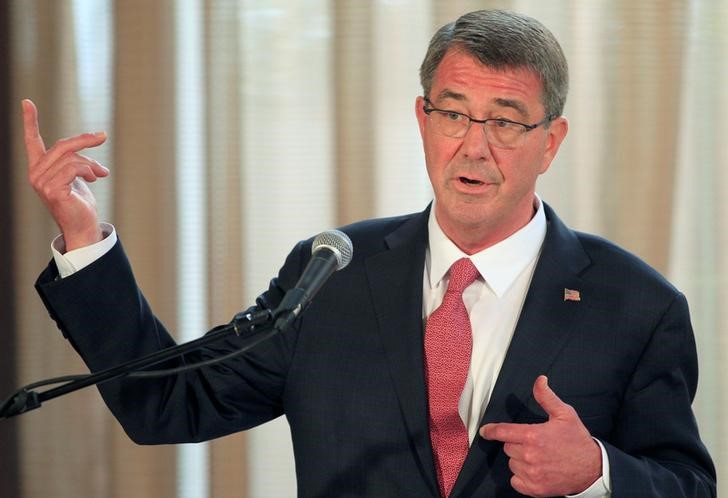By Yeganeh Torbati and Ben Blanchard
MANILA/BEIJING (Reuters) - U.S. Defense Secretary Ash Carter visited a U.S. aircraft carrier transiting the disputed South China Sea on Friday, as China said one of its top military officers had visited islands and reefs in the region to oversee building work.
China claims almost the entire South China Sea, believed to have huge deposits of oil and gas. Brunei, Malaysia, the Philippines, Taiwan and Vietnam also have claims to parts of the waters, through which about $5 trillion in trade is shipped every year.
Carter flew to the USS John C. Stennis after getting a situation briefing at a Philippine base on the western island of Palawan.
"With each Balikatan and each cruise by the Stennis, with each new multilateral exercise and each new defence agreement, we add a stitch to the fabric of the region's security network," Carter at the close of joint U.S.-Philippines "Balikatan" military exercises in Manila before the ship visit.
"This is the network - peaceful, principled, and inclusive - America continues to stand for, and stand with."
Though not unprecedented, it was still a visit likely to inflame tensions with China, which says the United States is "militarising" the South China Sea and endangering security. Carter visited another carrier in the region last November.
The United States has already conducted what it calls "freedom of navigation" patrols in the area, sailing within 12-nautical mile territorial limits around disputed islands controlled by China to underscore its right to navigate the seas.
In a brief statement, China's Defence Ministry said Fan Changlong, one of the vice chairmen of the Central Military Commission which controls China's military, had recently visited some of China's islands and reefs there.
While not saying where or when he went, it did say he met soldiers and inspected building work.
China is building lighthouses and other civilian facilities there it says are for all the sea's users. The ministry added that four of the five lighthouses were now in operation.
It had earlier denounced plans announced in Manila on Thursday to deepen U.S.-Philippine military ties, including joint patrols in the South China Sea, saying they reflected a "Cold War mentality".
CHINA SAYS U.S. PROMOTING MILITARISATION OF SEA
Chinese Foreign Ministry spokesman Lu Kang said the U.S. move proved "who was the real promoter of the militarisation of the South China Sea".
The United States had never been able to give an example of civilian freedom of navigation being affected in the South China Sea, he told a daily news briefing.
"In reality, what the U.S. is probably talking about is military freedom of navigation and safety. If that's the case, then many countries, not only in this region, will hope that these big countries can act in accordance with international law."
Carter said on Thursday the U.S. strategy was aimed at maintaining peace and lawful settlement of disputes, not provoking a conflict with a major world power.
"Countries that don't stand for those things, or don't stand with those things, are going to end up isolating themselves. But that will be self-isolation, not isolation by us," Carter said.
The carrier stop caps off a trip to Asia designed to highlight the expanding partnerships the United States is building with countries in the region, which Carter said had been asking for a greater U.S. role.
"We will continue to stand up for our safety and freedoms, for those of our friends and allies, and for the values, principles, and rules-based order that has benefited so many for so long," Carter said.
Hundreds of U.S. troops and some aircraft will stay behind in the Philippines temporarily, and on Thursday, the two countries revealed they had begun conducting joint patrols in the South China Sea.
